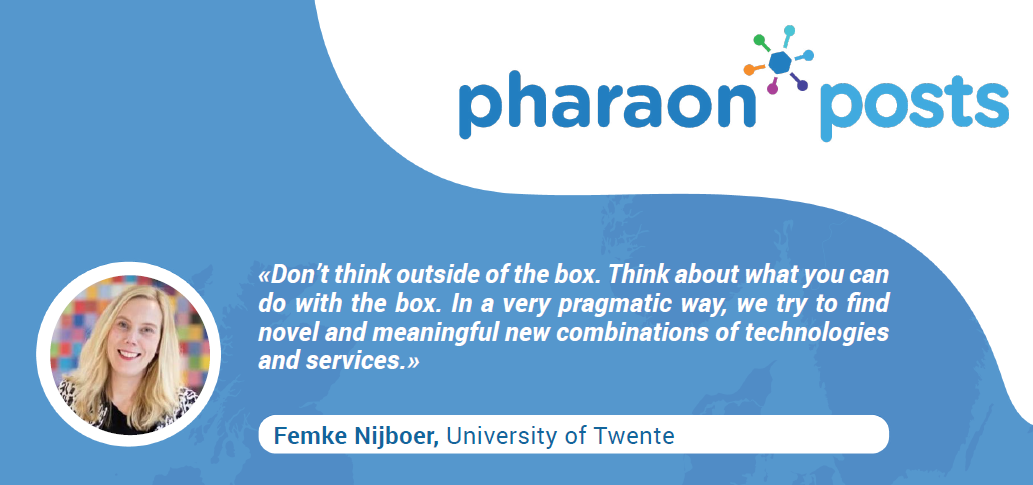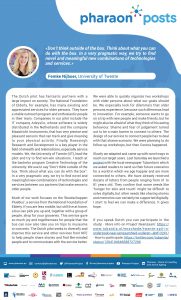
04 Jun Pharaon posts! Femke Nijboer, Dutch Pharaon pilot
 The Dutch pilot has fantastic partners with a large impact on society. The National Foundation of Elderly, for example, has many existing and appreciated services for older persons. They have a stable outreach program and enthusiastic people in their team. Companies in our pilot include the IT company AdsysCo, whose software is widely distributed in the Netherlands and the company Maastricht Instruments, that has very precise and pleasant sensors that can track and give meaning to your physical activity. Finally, Roessingh Research and Development is a key player in the field of eHealth and telemedicine, especially service models. We, the University of Twente (UT), lead the pilot and try to find win-win situations. I teach at the bachelor program Creative Technology of the university. We use to say “Don’t think outside of the box. Think about what you can do with the box”. In a very pragmatic way, we try to find novel and meaningful new combinations of technologies and services between our partners that make sense to older people.
The Dutch pilot has fantastic partners with a large impact on society. The National Foundation of Elderly, for example, has many existing and appreciated services for older persons. They have a stable outreach program and enthusiastic people in their team. Companies in our pilot include the IT company AdsysCo, whose software is widely distributed in the Netherlands and the company Maastricht Instruments, that has very precise and pleasant sensors that can track and give meaning to your physical activity. Finally, Roessingh Research and Development is a key player in the field of eHealth and telemedicine, especially service models. We, the University of Twente (UT), lead the pilot and try to find win-win situations. I teach at the bachelor program Creative Technology of the university. We use to say “Don’t think outside of the box. Think about what you can do with the box”. In a very pragmatic way, we try to find novel and meaningful new combinations of technologies and services between our partners that make sense to older people.
Much of our work focuses on the ‘Boodschappen PlusBus’, a service from the National Foundation of Elderly. If you are less mobile, but still live at home, a bus can pick you up and, together with a group of people, shop for your groceries (boodschappen in Dutch). This service gave so much joy and togetherness for people that the bus can now also take you on trips to museums or concerts. The Dutch pilot seeks to diversify and improve this service and other services from NFE to help people share stories and find like-minded people and to communicate with the service better (i.e., make it easier for an older person to signal that they won’t be able join the bus because of health problems).
We were able to quickly organize two workshops with older persons about what our goals should be. We especially look for dilemma’s that older persons experience, because such dilemmas lead to innovation. For example, someone wants to go on a trip with new people and make friends, but he might also be afraid of what they think of his eating behaviour. Shame and fear of judgement turned out to be a main barrier to connect to others. The design of our service to connect people has to deal with that shame scenario. We were planning to do follow up workshops, but then Corona happened.
All of a sudden, we were stuck at home, with partners who had just begun to get to know each other. We had to remotely and digitally work together to create use case scenarios for older persons who we could no longer visit. Slowly we adapted and came up with novel ways to reach our target users.
For example, last Saturday we launched a project with the local newspaper Tubantia in which we asked readers to send us their future scenarios for a world in which we age happier and are more connected to others. We have already received dozens of letters from people ranging from 31 to 81 years old. They confirm that some needs like ‘hunger for skin and touch’ might be difficult to solve digitally, but other needs like sharing stories and memories can certainly be supported digitally. I started to feel we can make a difference. It gives hope.
If you speak Dutch you can participate in the study:
- More info on Project Neenzaam: https://www.tubantia.nl/enschede/twente-spil-in-onderzoek-naar-eenzaamheid-ouderen~ab813241/
- How to participate: https://twitter.com/tubantia/status/1264104646588727296
Download “Pharaon posts! Femke Nijboer, Dutch Pharaon pilot” as .pdf

